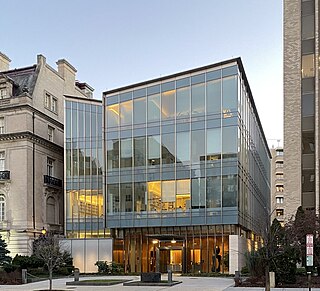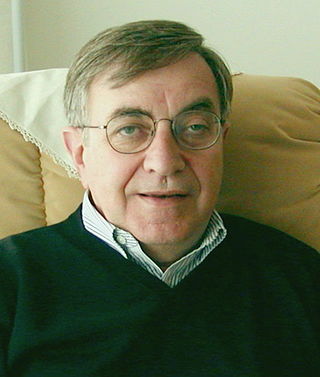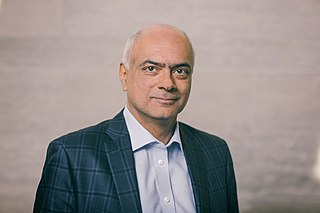
James Joseph Heckman is an American economist and Nobel laureate who serves as the Henry Schultz Distinguished Service Professor in Economics at the University of Chicago, where he is also a professor at the College, a professor at the Harris School of Public Policy, Director of the Center for the Economics of Human Development (CEHD), and Co-Director of Human Capital and Economic Opportunity (HCEO) Global Working Group. He is also a professor of law at the Law School, a senior research fellow at the American Bar Foundation, and a research associate at the NBER. He received the John Bates Clark Medal in 1983, and the Nobel Memorial Prize in Economic Sciences in 2000, which he shared with Daniel McFadden. He is known principally for his pioneering work in econometrics and microeconomics.

Jagdish Natwarlal Bhagwati is an Indian-born naturalized American economist and one of the most influential trade theorists of his generation. He is a University Professor of economics and law at Columbia University and a Senior Fellow in International Economics at the Council on Foreign Relations. He has made significant contributions to international trade theory and economic development.

The Peterson Institute for International Economics (PIIE), known until 2006 as the Institute for International Economics (IIE), is an American think tank based in Washington, D.C. It was founded by C. Fred Bergsten in 1981 and has been led by Adam S. Posen since 2013. PIIE conducts research, provides policy recommendations, and publishes books and articles on a wide range of topics related to the US economy and international economics.
Michael J. Trebilcock is a New Zealand-born, Canadian-based law academic. He is currently distinguished university professor and professor of law at the University of Toronto, specializing in law and economics.

Ha-Joon Chang is a South Korean economist and academic. Chang specialises in institutional economics and development, and lectured in economics at the University of Cambridge from 1990–2021 before becoming professor of economics at the School of Oriental and African Studies (SOAS) in 2022. Chang is the author of several bestselling books on economics and development policy, most notably Kicking Away the Ladder: Development Strategy in Historical Perspective (2002). In 2013, Prospect magazine ranked Chang as one of the top 20 World Thinkers.

Gary P. Sampson is professor of international trade at Melbourne Business School (MBS), Melbourne University, Australia.

Elhanan Helpman is an Israeli economist who is currently the Galen L. Stone Professor of International Trade at Harvard University. He is also a Professor Emeritus at the Eitan Berglas School of Economics at Tel Aviv University. Helpman is among the thirty most cited economists in the world according to IDEAS/RePEc.
The Global Environment & Trade Study (GETS) was a non-profit research institute established in 1994 to study the complex linkages between international trade and environmental sustainability. GETS supported numerous research projects on the legal, economic, and ecological aspects of trade and environment.
John Sullivan Wilson is a former Lead Economist (retired) of the World Bank. He directed and managed research on transparency, trade facilitation, regulation, and economic development. Mr. Wilson served in the Development Research Group of the World Bank and also in operations in the Infrastructure Vice Presidency.

Anne Osborn Krueger is an American economist. She was the World Bank Chief Economist from 1982 to 1986, and the first deputy managing director of the International Monetary Fund (IMF) from 2001 to 2006. She is currently the senior research professor of international economics at the Johns Hopkins School of Advanced International Studies in Washington, D.C. She also is a senior fellow of Center for International Development and the Herald L. and Caroline Ritch Emeritus Professor of Sciences and Humanities' Economics Department at Stanford University.

Amir Ullah Khan is a professional economist and professor who works on development issues primarily in the health, education, and agriculture sectors. Prof. Khan has worked for the Ministry of Finance, Government of India and the UNDP at Project LARGE. He is a former Deputy Director and policy advisor to the Bill and Melinda Gates Foundation. Prof. Khan writes a regular column for the business news publication livemint.com and for the newspaper etemaaddaily.com He is also a visiting professor at the Indian School of Business and at NALSAR in Hyderabad.
Jock Robert Anderson is an Australian agricultural economist, specialising in agricultural development economics, risk and decision theory, and international rural development policy. Born in Monto, Queensland, he studied at the University of Queensland, attaining bachelor's and master's degrees in agricultural science. After graduation, Anderson joined the Faculty of Agricultural Economics at the University of New England. At New England, he focused on research in farm management, risk, and uncertainty and received a doctor of philosophy in economics in 1970. In 1977, Anderson co-authored a book, Agricultural Decision Analysis, which has served as an influential source on risk and decision analysis for agricultural economics researchers and the agricultural industry.

Shenggen Fan (樊胜根) was the Director General of the International Food Policy Research Institute (IFPRI) between 2009 and 2019.

The Institute of Economic Growth (IEG) is an autonomous, multidisciplinary Centre for advanced research and training. Established in 1958, its faculty of about 23 social scientists and a large body of supporting research staff focus on areas of social and policy concern.

Ashok Gulati is an Indian agricultural economist and a former chairman of the Commission for Agricultural Costs and Prices (CACP), the advisory body of the Government of India on food supplies and pricing policies. Gulati was instrumental in the hiking the minimum support price of several food grains. Currently he is Infosys chair professor for Agriculture at Indian Council for Research on International Economic Relations (ICRIER). He is also a member of the Task Force on Agriculture set by the prime minister under NITI Aayog and chairman of the Expert Group on Agriculture Market Reforms (2015). He was an active member of the high-level committee set up by the NDA Government to restructure and reorient Food Corporation of India in order to improve its operational and financial efficiency.
Gary Don Libecap is an American economist who is currently an emeritus professor in the Department of Economics and the Bren School at the University of California, Santa Barbara. Libecap’s specialty is environmental economics, and his research focuses on the role of property rights institutions in addressing the open access losses for natural resources such as fisheries and freshwater, as well as the role of water markets in encouraging efficient use and allocation. He has authored or co-authored over 200 peer-reviewed papers, lectured widely, and written articles that have appeared in the New York Times and the Wall Street Journal.

Rohinton P. Medhora is a Canadian economist. His fields of expertise are monetary and trade policy, international economic relations, and development economics. He is a Centre for International Governance Innovation (CIGI) distinguished fellow, former president of CIGI and professor of practice at McGill University's Institute for the Study of International Development.

Joachim von Braun is a German agricultural scientist and currently director of a department of the Center for Development Research at the University of Bonn and President of the Pontifical Academy of Sciences.
Anna Strutt is a New Zealand academic, and is a full professor of economics at the University of Waikato, specialising in international policy analysis.

Anabel González is an economic development expert. She is currently Vice President for Countries at the Inter-American Development Bank (IDB).













